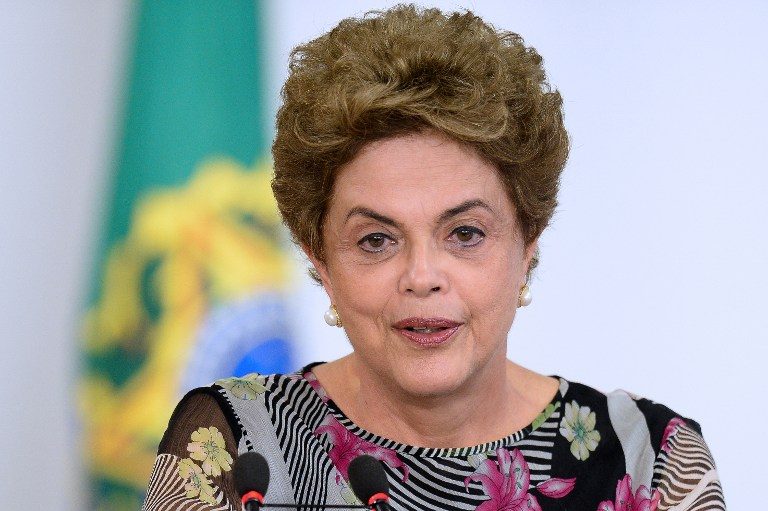SUMMARY
This is AI generated summarization, which may have errors. For context, always refer to the full article.

BRASILIA, Brazil (UPDATED) – The top attorney for Brazilian President Dilma Rousseff’s government made his last stand Monday, April 4, against the effort to impeach her, lambasting the case and warning of a stain on democracy.
Attorney General Jose Eduardo Cardozo made his final arguments before a congressional impeachment committee, a clutch moment in a political crisis that has brought the government of Latin America’s biggest economy to the brink of collapse as it battles a deep recession and corruption allegations.
Cardozo denied Rousseff took out unauthorized government loans to hide the depth of the recession, and said the accusation was in any case not an impeachable offense.
“As such, impeaching her would be a coup, a violation of the constitution, an affront to the rule of law, without any need to resort to bayonets,” he told the 65-member committee.
The hearing kicked off two crucial weeks that could decide Rousseff’s political fate.
The commission’s recommendation on whether to try Rousseff, expected on April 11, will set the tone for a vote soon after in the lower house.
Two-thirds of the Chamber of Deputies, or 342 votes, are needed to send the case for trial in the Senate. The lower house vote is expected to take place on April 17, newspaper Folha de Sao Paulo reported.
As the impeachment battle played out, Rousseff scrambled to cement new alliances after her main coalition partner, the PMDB party, went over to the opposition last week.
The PMDB, a political juggernaut, is the party of house speaker Eduardo Cunha, the man leading the impeachment push, and Vice President Michel Temer, who will become president if it succeeds.
The attorney general called the case an “act of revenge” by Cunha, a scandal-plagued but powerful politician.
He accused Cunha of unleashing the impeachment storm because he was furious the Rousseff administration “didn’t support him” when the house ethics committee opened an investigation into allegations the speaker was involved in a huge embezzlement and bribery scandal at state oil company Petrobras.
“A new government must not be born with this stain of illegitimacy,” Cardozo warned.
“Brazil’s democracy is at stake… Removing a head of state elected by the people is an exceptionally grave measure that cannot be based on her unpopularity.”
Brazil’s Panama Papers
Rousseff’s approval rating has plunged to 10%, according to polls.
But those working to oust her face serious allegations themselves.
Temer has been linked to the Petrobras scandal, though he has not been charged. And Cunha was charged last year with taking millions of dollars in bribes in the scandal.
Cunha was also among scores of Brazilians caught up in the ‘Panama Papers’ scandal that erupted Sunday, April 3, when media published documents revealing offshore accounts held by public figures worldwide.
His name does not appear on the list, but it included one firm owned by him, according to three Brazilian news organizations that joined in publishing the leaks.
The house speaker denied the allegation in a statement.
The PMDB was long an awkward partner for Rousseff and her Workers’ Party (PT).
Now that their divorce is official, Rousseff, 68, is jettisoning PMDB appointees from prized government posts and giving them to parties that could bring her the congressional votes needed to avoid impeachment.
The latest casualty was the head of state tourism agency Embratur, a Temer appointee.
Rousseff could also find out this week if the Supreme Court agrees to let heavy-hitting but controversial ex-president Luiz Inacio Lula da Silva join her cabinet.
He has been barred because he is accused in a case connected to the Petrobras scandal.
Huge opposition rallies and smaller pro-Rousseff rallies in recent weeks have highlighted sharp divisions in Brazil that some fear could turn violent even as the Rio de Janeiro Olympics hover just four months away.
The political tensions have only exacerbated the country’s economic mess.
The market is now betting the economy will shrink by 3.73% this year, a central bank survey found – even worse than the International Monetary Fund’s forecast of a 3.5% recession.
Brazil’s economy contracted 3.8% last year, and a second year of recession would be the worst slump since the Great Depression. – Damian Wroclavsky, AFP / Rappler.com
Add a comment
How does this make you feel?
There are no comments yet. Add your comment to start the conversation.